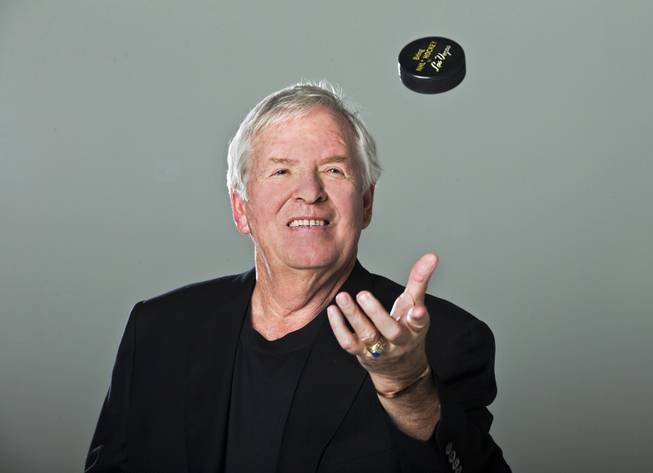Saturday, March 28, 2015 | 2 a.m.
If the National Hockey League grants Las Vegas an expansion franchise, prospective owner Bill Foley has a timetable for the team’s performance on the ice.
More Coverage
- 5 things the hockey ownership group would need to address
- Group trying to bring NHL to Las Vegas secures 8,000 season ticket deposits
- Las Vegas’ case for hockey: Desert aside, we could have a leg up on other cities
- NHL commissioner’s message to Las Vegas: Don’t get ahead of yourself
- The Sun's NHL to Las Vegas section
“Playoffs in three years,” he said. “Playoffs in three years, period.”
There’s precedent for Foley’s goal set by other expansion franchises.
The Florida Panthers in 1996 reached the Stanley Cup finals in their third season. The Minnesota Wild went to the conference finals in their third year, and the San Jose Sharks were a playoff team three years after launching.
Other recent expansion teams took longer. The Anaheim Ducks and the Tampa Bay Lightning needed four years to make the postseason. The Columbus Blue Jackets needed eight.
A Las Vegas franchise would build much of its roster through an expansion draft, in which a team selects players from the league’s existing clubs and assumes that player's contract. Foley anticipates building a competitive club that way, especially if Las Vegas were to be the only team joining the league. Las Vegas would be the 31st NHL team, and there's speculation that the league would add a 32nd to give it four eight-team divisions.
“There are a lot of good players out there on those 30 teams,” he said.
In the most recent expansion drafts, teams were each allowed to protect either one goaltender, five defensemen and nine forwards, or two goaltenders, three defensemen and seven forwards. With their 26 picks, expansion teams chose three goaltenders, eight defensemen and 13 forwards; they could address any position with the final two picks.
A Las Vegas expansion team likely would choose from a list that includes former standouts on the downsides of their careers, prospects who never panned out and physical grinders.
Because elite goal scorers are so valuable, expansion drafts usually lack offensive firepower — so you won’t see stars such as Sidney Crosby, Patrick Kane or Alexander Ovechkin left unprotected.
Notable players chosen in expansion drafts include goaltenders Mike Vernon (Minnesota, 2000), Mike Richter (Nashville, 1998), Tomas Vokoun (Nashville) and John Vanbiesbrouck (Florida, 1993); forward Geoff Sanderson (Columbus, 2000) and Brian Bradley (Tampa Bay, 1992); and defenseman Mathieu Schneider (Columbus).
Often, players selected in expansion drafts never play for the team that chose them — they get flipped to a different franchise for other players or draft picks.
Existing teams also can make deals to avoid losing certain players. In 1998, the Los Angeles Kings traded prospect Kimmo Timonen and another player to Nashville after the Predators agreed not to select defenseman Garry Galley. Timonen went on to become the Predators’ captain and has played more than 1,100 games in the NHL.
An expansion draft would be the first since the league added a salary cap in 2005. The cap could benefit a Las Vegas expansion team, as other franchises might leave unprotected talented but underperforming veterans with high salaries, such as Vincent Lecavalier, Alexander Semin and David Clarkson.
Las Vegas also could pursue big-name free agents.
“Look at the advantage we have from a financial standpoint of being in Las Vegas: There’s no state income taxes,” Foley said. “I can go to every guy in California and say, ‘The first thing I’m gonna do is save you 14 percent. That’s what you’re paying over there.’ And how about the Canadians? … They pay a ton.”
All of the league's U.S. teams are in states with an income tax except for Tampa Bay, Florida, Nashville and the Dallas Stars.
A Las Vegas team also would build for the future through the NHL entry draft, likely starting out with a high pick. In the 2000 draft, the Wild selected forward Marian Gaborik third overall and the Blue Jackets took defenseman Rostislav Klesla with the fourth pick. Both players were standouts for about a decade with their respective teams.
Other players chosen in the entry draft could make an impact on a Las Vegas team within a few years.
“I think three years for the playoffs is an aggressive goal, but it’s realistic,” Foley said.
Brian Deka can be reached at 702-259-4073 or [email protected]. Follow Brian on Twitter at twitter.com/briandeka.


Join the Discussion:
Check this out for a full explanation of our conversion to the LiveFyre commenting system and instructions on how to sign up for an account.
Full comments policy